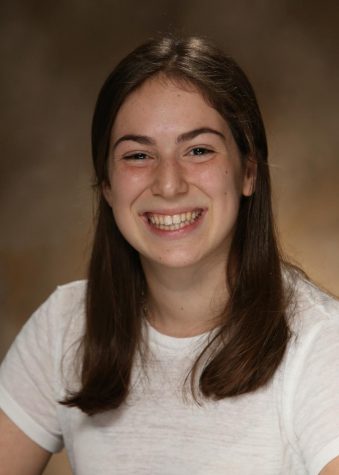Environmental club pushes students to think hard before they discard
January 31, 2018
The small, blue bins in every classroom have one purpose: to be used for recycling. When junior Dora Mendelson looks inside most of the recycling bins, however, she often finds recyclables mixed with food products and other non-recyclable items.
According to Director of Facilities Israel Moskowitz, the recycling system at JDS started in 2000 when Montgomery County passed a law requiring schools to recycle. The legislation, however, does not define a fixed system for how to carry out the recycling initiative.
Montgomery County’s requirement is that there is one centralized bin where all of the recycling should be placed for pick up. JDS took this “a [step] further,” according to Moskowitz, and put blue bins and boxes throughout the school to make the system easily accessible.
Moskowitz said that whenever something other than recyclables is placed in the recycling bins, none of the paper can be collected by the county to recycle. When food touches the paper in the bins, it immediately contaminates the paper and everything in the bin must be thrown out instead of being recycled.
To resolve this issue, Moskowitz believes that school should educate the students about recycling. Montgomery County provides educators that can come to the school in efforts to increase recycling, but JDS has not utilized this opportunity. The Upper School used to have a green team made up of students who were in charge of educating the school about recycling, according to Moskowitz. However, there has not been an organized team in a number of years. Without the education, Moskowitz thinks that it is hard for students to recycle.
“The problem’s not in the system, the problem is in adhering to the system,” Moskowitz said. “If we want to up the numbers, we have to do a program in the school to educate the kids, to get them involved to do more recycling.”
Mendelson agrees with Moskowitz that this problem is mainly a student body issue and she is trying to help handle it. Mendelson is a leader of the Environmental Protection Club along with junior Addie Bard. The club is trying to take on the responsibilities of the green team, but they have a new name with new members.
Currently, the Environmental Protection Club is working on spreading awareness on how to be green. While they have communicated with the administration about their goals, the administration has neglected to provide resources and any new ideas. The club has only three members, excluding Mendelson and Bard. She said that the lack of numbers is causing some obstacles for the club’s goals.“Going into
“Going into second semester we’re trying to appeal to all different types of people so that the club grows and we can actually facilitate change in the school with recycling and being more green,” Mendelson said. “But we really can’t do that unless we have a substantial group of people.”
At the Lower School, there is a composting system located in a science classroom. The Upper School has discussed doing something similar, but they have not yet created a plan.
According to High School Principal and Associate Head of School Marc Lindner, there have been talks of adding composting to the Upper School in a similar fashion to the system at the Lower School. This attempt, however, has not been very successful because there is no location where the compost can be placed.
Although attempting to add something green to the school did not work out, according to Lindner, the faculty has been encouraged to carry reusable water bottles with them instead of using disposable ones.
Additionally, Mendelson said that the Environmental Protection Club is working on posters to put around the school explaining what goes in both the trash cans and the recycling bins.
While Mendelson and her club work to teach the school about the recycling system, the lack of current education in the school is noticeable to freshman Tal Arber. Arber said that his friends “ignore” the recycling system at the school and he has even witnessed a friend throwing a plastic water bottle into a trash can instead of a recycling bin. Arber told his friend during this event that he should not have thrown the bottle away, but he noticed that his friend did not listen to him.
Arber knows the positive effects of recycling and uses them to motivate him to do so, but this knowledge did not come from JDS. He learned about recycling at Camp Ramah in New England, a sleepaway camp in Palmer, Mass.
“Actually, one year at camp they had a guy come and talk to us about the effects of recycling and how it’s good for the environment and so from then on I just realized, ‘Oh, I should just start recycling especially since it’s not really hard,’” Arber said.
There are some students, like Arber, correctly using the recycling system at JDS, but both Mendelson and Moskowitz agree that the system in place can work, as long as the students know how to use it.
“[The problem]’s not in the system, it’s in the education,” Moskowitz said.








